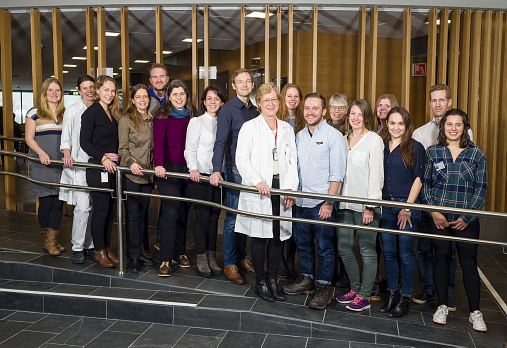We perform clinical and epidemiological studies, MRI studies, genetic studies and functional molecular studies. The group surveys disease mechanisms in MS in a translational perspective by utilize patient and test material, collected at Oslo University Hospital, by national and international collaborators.
Oslo MS Registry and Biobank Norway includes approximately 2 500 MS-patients, who are characterized clinically, and we have material for genetic studies from approximately 1 000 patients.
We cooperate mainly with national and international partners, and participate, among others, with a large EU funded, international consortium; MultipleMS.
We also have access to several thousands of additional samples through collaborations with the Norwegian MS Registry and Biobank and the Nordic Network of MS Genetics.
We are active in international collaborations, especially in the International MS Genetics consortium (IMSGC).
Our work has made important contributions to genetic studies of MS (IMSGC, Nature 2011 and IMSGC, Nature Genetics 2013).
We are working on mapping these genetic and other risk factors of MS, and study how this influences the clinical information about the disease.
Projects
The group performs various types of translational studies by MS, and focus upon the following
Clinical, paraclinical and epidemiological studies
Clinical information about disease characteristics and treatment, supplementary investigations as well as information collected by questionnaires are collected and included in ongoing studies.
We have a special focus on clinical and epidemiological studies of non-ethnic Norwegians.
MRI Projects
In longitudinal and cross-sectional studies we study magnetic resonance image (MRI) changes, especially related to detailed clinical features, including cognition and eye function.
We study novel MRI techniques in collaboration with our national and international partners.
Genetic studies
Through genome-wide association studies (GWAS), and other large gene-mapping studies performed in collaboration with the International MS genetics consortium (IMSGC), we have identified a list of more than 200 risk factors.
These studies have generated a wealth of data that has to be analyzed using advanced biostatistics to unravel disease mechanisms.
We collect and analyse samples and clinical data from a very detailed characterized group of newly diagnosed MS patients with the aim to combine clinical and genetic information, and pursue cutting edge projects including expression analyses and epigenetic studies.
Molecular immunology
We aim to study the impact of genetic associations in MS on immune cell pathways of importance for MS development.
Furthermore, to link genetics with functional relevance, we currently perform functional characterization of selected MS associated, immune-related genes, using immune-based techniques such as Flow cytometry, Western blotting and ELISA.
Cooperation
Our research group has collaboration with several national and international institutions.
- Department of Radiology and Nuclear Medicine, Oslo University Hospital
- Department of Medical Genetics, Oslo University Hospital
- Department of Psychology, University of Oslo
- Institute of Basic Medical Sciences, University of Oslo
- Department of Ophthalmology, Institute of Clinical Medicine, University of Oslo
- NORMENT, University of Oslo
- Hakadal MS centre
- SINTEF
- Norwegian MS-Registry and Biobank
- Nordic Multiple Sclerosis Genetics Network
- University of Cambridge Multiple Sclerosis Genetics Group
- International Multiple Sclerosis Genetics Consortium (IMSGC)
